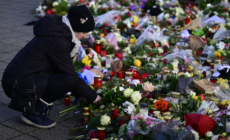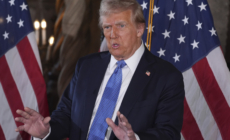-
Newsom reads the election returns and heads to red California - 6 mins ago
-
‘SNL’ Takes on New Jersey Drones: ‘Dumb Theories’ - 39 mins ago
-
A Woman With a Rare Gene Mutation Fights to Avoid Her Mother’s Fate - 46 mins ago
-
Newsom and a fellow Democrat spar over constitutional convention on gun control - 47 mins ago
-
Germany Christmas Market Latest: Suspect Remanded in Custody - about 1 hour ago
-
Inside China’s intelligence operation in L.A. County - about 1 hour ago
-
What Nantucket Owes the Whale - about 1 hour ago
-
What stores are open on Christmas Day 2024? - 2 hours ago
-
Trump’s deportations on a collision course with California’s economy - 2 hours ago
-
U.S. Fighter Jet Shot Down Over Red Sea by Apparent Friendly Fire - 2 hours ago
Harvard Professor’s Demand of Jack Smith Sparks Legal Analyst Backlash
Legal analysts are pushing back against a Harvard Law School professor’s demand that special counsel Jack Smith explain his handling of the federal election subversion case against former President Donald Trump.
Professor Jack Goldsmith, a former assistant U.S. attorney during the George W. Bush administration, accused Smith and the Department of Justice (DOJ) of undermining “public confidence” that prosecutions are “conducted fairly and apolitically” in an October 9 opinion article published by The New York Times.
Goldsmith wrote that Smith, who also indicted Trump on federal charges related to his handling of classified documents, had “failed” in taking “scrupulous care to assure the public that the prosecutions are conducted in compliance with pertinent rules.”
Pointing to Smith’s recently unsealed brief containing evidence in support of allegations that Trump attempted to illegally overturn his defeat in the 2020 election, Goldsmith argued that Smith had violated the DOJ’s unwritten “60-day rule” against taking action that could influence an election within 60 days of the vote.

Drew Angerer
“It is hard to understand any reason to go forward this close to the election other than to influence it—a motive that would clearly violate department policy,” Goldsmith wrote. “It is imperative that the department explain in detail why this inference is false and why its actions comported with past department practices and understandings.”
“Mr. Smith, at a minimum, created a strong appearance of impropriety without any explanation in a context in which public confidence in the integrity of his decisions is vital,” he added.
Goldsmith went on to argue that the filing of the brief was “not the first time Mr. Smith has appeared to disregard relevant department rules,” writing that the special counsel “never explained the need for speed” when asking for expedited rulings on Trump’s claims of presidential immunity.
In an article published by Just Security on Tuesday, legal analysts Andrew Weissmann and Ryan Goodman, a former federal prosecutor and a former Pentagon special counsel, respectively, argued that Goldsmith’s article “ignores hard facts.”
The analysts wrote that Smith had referenced “well-settled case law” on speedy trials when asking for Trump’s case to be settled quickly, while pointing out that the special counsel never asked to file his brief before the election and instead was directed to do so by U.S. District Judge Tanya Chutkan, who is overseeing the case.
“Goldsmith makes no note of any of this,” Weissmann and Goodman wrote. “And, ignoring all this, Goldsmith does not explain how he has nevertheless, in effect, divined that Smith’s true ‘purpose’ must have been to violate the DOJ Manual.”
Newsweek reached out for comment to Goldsmith via email on Tuesday night.
Weissmann and Goodman also argued that claims about the prosecution of Trump violating the 60-day rule are based on an “easily debunked fallacy.” The DOJ says that the unwritten policy does not apply to figures that have already been charged with crimes, as is the case with Trump.
The analysts noted that Goldsmith said that attorneys general had “enormous discretion” to “abandon any internal DOJ ‘rule'” in September 2020, when any “derogatory information” about political candidates “would have been released by Attorney General Bill Barr, whose actions Goldsmith’s words supported.”
“This may help explain why, despite his focus on DOJ actions, Goldsmith’s critique includes a strained sideswipe of Vice President Kamala Harris,” Weissmann and Goodman wrote. “Goldsmith ends his piece by then placing Harris right alongside Smith as ‘near the top of the list’ for contributing to the “sharp decline in trust of our justice institutions.'”
“In short, it takes a conspiracy theory vast in scope at the Justice Department, and well beyond Smith himself, to come to the critics’ conclusions,” they added. “It also takes losing sight of the bigger picture.”
Source link



















